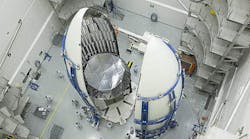Defense contractor Lockheed Martin has made a new investment in alternative-fuel technology, buying “substantially all of the assets” of a high-tech start-up founded on the promise of capturing hydrogen in water molecules and storing it for later use. It’s an idea that links two of the more elusive concepts of industrial technology — affordable green energy and reliable fuel cells.
Fuel cells, in particular, are important to increasing industrial as well as consumer fuel efficiency.
Lockheed is gaining the Sun Catalytix Corporation’s intellectual property, contracts, and facilities, and the Cambridge, Mass., company’s approximately 25 employees will remain with the organization under the new ownership. It will be a wholly owned subsidiary known as Lockheed Martin Advanced Energy Storage LLC, which it emphasized would complement its existing capabilities in “energy management and efficiency.”
Sun Catalytix was founded by Daniel Nocera, a former Massachusetts Institute of Technology chemist, whose concept involves mimicking photosynthesis by extracting hydrogen particles for water molecules. The goal of the research was to develop an affordable catalyst that would capture the hydrogen molecules in water and the distribute the fuel to reliable storage cells. It anticipated that solar panels would power catalytic process, underscoring its clean-energy potential.
As a separate initiative, the company also researched battery technology, and that effort drew support financing from Tata Group, the Indian automaking conglomerate.
Lockheed did not disclose the terms of the purchase, claiming those are “not material” to its organization. Its description of Sun Catalytix as a company “developing an affordable, durable, safe and scalable energy storage technology” suggests its interest in more focused on the potential fuel cells than on the hydrogen capture possibilities.
Hydrogen is seen by many as the perfect fuel because it is widely available in nature and can be combusted without any carbon emissions. Wind and solar energy offer some of the same advantages, but the energy captured in those processes is more difficult to store and transport than carbon-based fuel supplies, like coal or natural gas.











